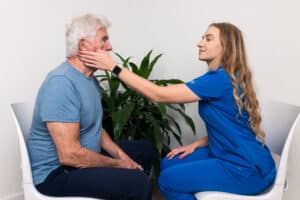When did Speech-Language Pathology Begin and What do SLPs Do?
When did speech-language pathology originate in United States and why was it needed? The first speech therapists were not called clinicians. They were individuals who wanted to help others improve their speech problems. In the early 1900s, “speech correctionists” had formed interest groups to help those who had stuttering or other related speech difficulties. Eventually, the American Academy of Speech Correction (AASC) formed and set high educational standards. One of the leading graduate programs was created by the University of Wisconsin in 1914. Some of the members of AASC were part of the founding group of the present-day American Speech-Language-Hearing Association or ASHA.
What do speech-language pathologists do as rehabilitation therapists? And why do older adults need speech therapy? Speech-Language Pathologists or SLPs treat communication and swallowing disorders.
They focus on speech sounds, aphasia, literacy, cognitive-communication, voice, social communication, fluency, feeding and swallowing. SLPs assess or evaluate a condition, diagnose it, and then treat the disorder, which can occur in older adults as a result of disease, age or trauma. Patients may be recovering from a number of illnesses including but not limited to:
- Stroke
- Traumatic Brain injury (TBI)
- Multiple Sclerosis
- Alzheimer’s Disease
- Parkinson’s Disease
- Laryngectomy
- Dysarthria
Older adults who suffer from neurologic conditions may also have difficulty with cognition and language expression, which may limit them from communicating basic needs. Speech therapists use exercises and tools to help patients speak with clarity. For diseases without a cure, the goal is to improve quality of life. Speech therapists help not only with expressive language (talking and writing) but they also help with receptive language, such as reading and listening. For those with swallowing concerns, SLPs may incorporate different exercises, trainings, patient and family caregiver education on safe swallowing techniques, and modifications to the texture or consistency of a patient’s diet.

Cornerstone Rehab clinicians work with older adults in skilled nursing settings to help them communicate better. Our SLPs at Cornerstone Rehab play a critical role in keeping older adults connected with their loved ones, improving their quality of life and promoting independence.
Search SLP job opportunities with CSR here.
